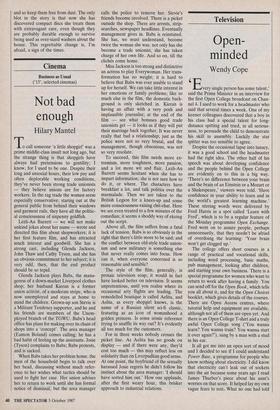Television
Open-
Wendy Cope
C Every single person has some talent,' said the Prime Minister in an interview for the first Open College broadcast on Chan- nel 4. I used to work for a headmaster who said that several times a week. One of my keener colleagues discovered that a boy in his class had a special talent for long- distance spitting and tried, in all serious- ness, to persuade the child to demonstrate his skill in assembly. Luckily the star spitter was too sensible to agree.
Despite the occasional lapse into lunacy, it was a good school and the headmaster had the right idea. The other half Of his speech was about developing confidence and the people behind the Open College are evidently on to this in a big way. `There's no difference between your brain and the brain of an Einstein or a Mozart or a Shakespeare,' viewers were told. 'Have confidence in your ability to learn and in the world's greatest learning machine.' These stirring words were delivered by Fred Harris in a spot called 'Learn with Fred', which is to be a regular feature of the Monday programme Open Exchange. Fred went on to assure people, perhaps unnecessarily, that they needn't be afriad of overdoing the learning: 'Your brain won't get clogged up.'
The college offers short courses in a range of practical and vocational skills, including word processing, basic maths, pub management, looking after children, and starting your own business. There is a special programme for women who want to return to work after having a family. You can send off for the Open Book, which tells you all about it, and for the Open Choices booklet, which gives details of the courses. There are Open Access centres, where tutorial help and equipment are available, although not all of them are open yet. And there is an Open College T-shirt and a truly awful Open College song (`You wanna learn? You wanna train? You wanna start it over again?'), sung by a man with a stud in his ear.
It all got me into an open sort of mood and I decided to see if I could understand Power Base, a programme for people who know nothing about electricity. I did know that electricity can't leak out of sockets into the air because some years ago I read James Thurber's piece about his aunt's worries on that score. It helped lay my own vague fears to regt. What no one had told Thurber's aunt or me is that air is an insulator. Now I know about insulators and conductors, circuits, AC, DC, volts, amps, and even how batteries are made. They repeated everything three times and it wasn't difficult at all.
In his second 'Learn with Fred' spot, Fred Harris dealt with the use of books. He pointed out that you don't always have to read them from cover to cover and showed students how to skim-read. One of the advantages of video is that it is now possible to skim-watch television program- mes. I found myself doing this with a tape of 'Laughter', the second programme in a Channel 4 series called Tears, Laughter, Fears and Rage. It included some well- chosen extracts from funny films and tele- vision programmes. One of the highlights was Joyce Grenfell's gloriously out-of-tune and thoroughly miserable rendering of a song that begins, 'Ha, ha, ha, ha, ha, ha, ha. I love to laugh.'
In between the clips a number of well- known people earnestly assured an inter- viewer that they, too, loved to laugh. Some of them attempted to explain why it was a valuable and important activity. Paul Boateng had one or two interesting things to say and Irene Handl can't be boring, but most of it was dull. Halfway through I decided to skip the rest of the interviews. Although I know that too much learning can't clog up the brain, I sometimes have vague fears about po-faced Channel 4 discussions.



















































 Previous page
Previous page